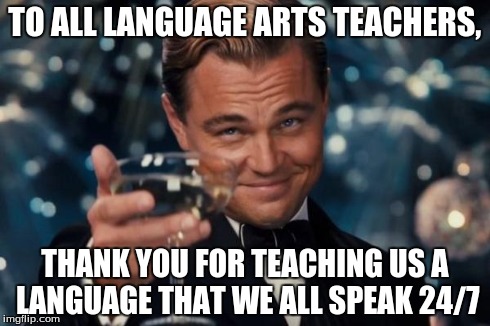I thought it was worth discussing here, too, so here are my thoughts.
 |
| My brother. Except he isn't Leo, obviously. |
Along the way, teachers select books for their students to read. Sometimes, these books are part of a bigger, government-dictated curriculum. Other times, teachers choose books they think will interest their students or help them through a particular stage in life. This is why so many middle schoolers find themselves reading coming of age books like Bridge to Terabithia or The Outsiders. Some teachers will also select books they loved themselves and want to share with the students, since the books are age appropriate (if your child's teacher has them reading Harry Potter, this is what happened). The other three factors I can think of that would affect book selection would be current or recent events, genre introduction and cultural aptitude (this is the main reason for all the Shakespeare, I'm sure of it).
Teachers guide youths' reading up until they are set free by the school system and either re-enter by going to college or go off on their merry way into the work force. Recreational reading outside of the assigned books is encouraged, of course, but you have to admit that teachers do a lot of book introducing for youth.
As for college, those language arts classes teach specific aspects of the language or writing in it. After all, even though you know how to read and write, you can still improve. This is why we continue taking language arts classes.
| Note: Philosophy can be taught using literature and film, too. |
As for what else people would be writing in those language arts classes, the only times in real life when essays are used are in the justice system, book introductions and academics, so far as I can tell. Adults write in other formats: blog posts, articles, press releases, business correspondence, letters (cover letters, query letters, others), creative writing, memoirs, reports (which aren't written in MLA format!), speeches, contracts, and more things I can't think of right now. Imagine how much better these communications would be if we had classes in how to write them well!
The main problem with this is we don't have teachers trained to teach all these various forms of writing.
But alas, I am not a teacher and would be scolded for telling other people how to do their jobs. So I'll step off my soapbox with one last sentence: Brother, language arts classes should continue, but with a stronger philosophy component and varied writing instruction.

No comments:
Post a Comment